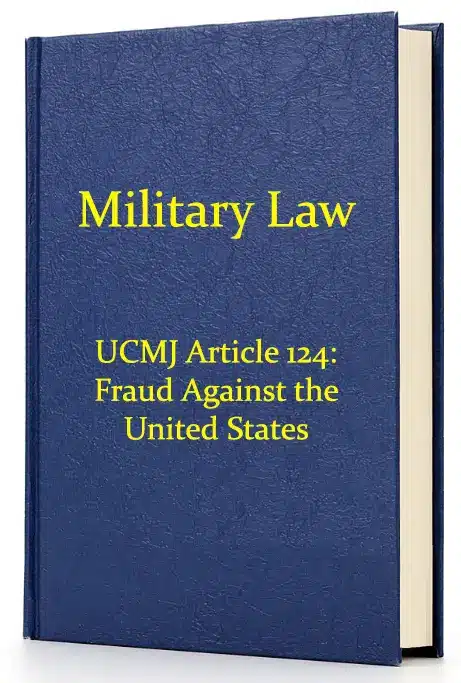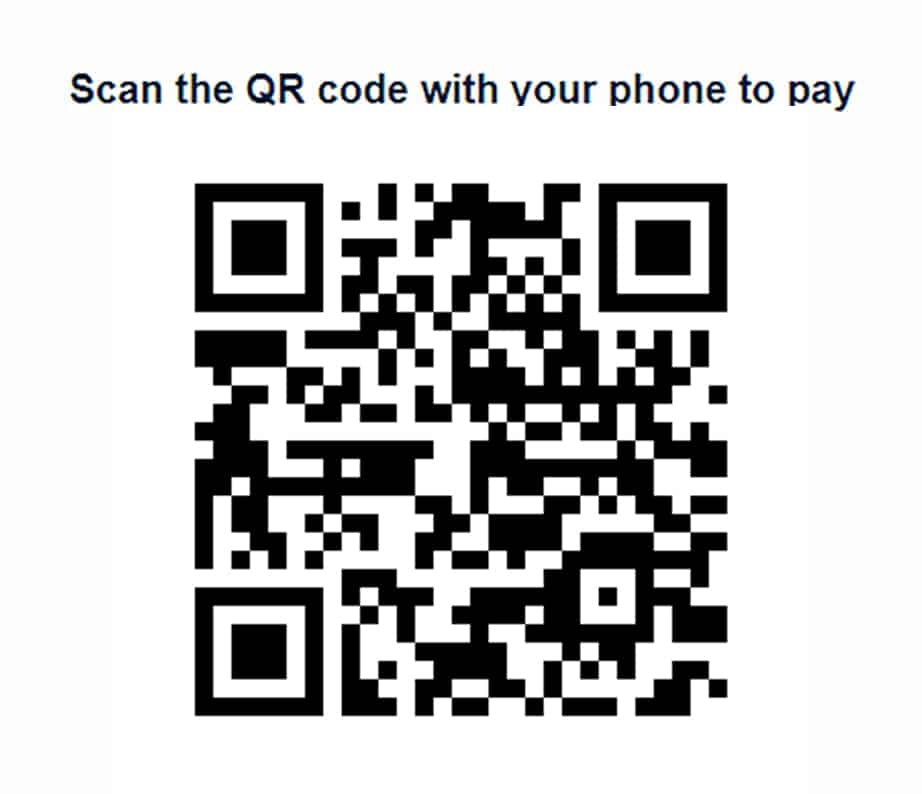The Manual for Courts-Martial states any service member may be subject to prosecution if they:
-
make any claim against the United States or any officer thereof, or present to any person in the civil or military service for the approval or payment, any claim against the United States or any officer thereof that they know to be false or fraudulent;
-
to obtain approval, allowance, or payment of any claim against the United States or any officer thereof, makes or uses any writing, paper, oath, forgery, or counterfeit writing knowing it is false, fraudulent, or counterfeited;
-
having charge, possession, custody, or control of any money or other property of the United States, furnished or intended for the armed forces thereof, knowingly delivers to any person having authority to receive it any amount thereof less than that for which he gets a certificate or receipt; or
-
is authorized to make or deliver any paper certifying the receipt of any property of the United States furnished or intended for the armed forces thereof, makes or offers to any person such writing without having full knowledge of the truth of the statements therein contained and with intent to defraud the United States.
To be prosecuted for making a false or fraudulent claim, it must be proven:
-
the accused made a specific claim against the United States or an officer thereof;
-
the claim was false or fraudulent in certain particulars; and
-
the accused then knew that the claim was false or fraudulent in these particulars.
Prosecution for presenting for approval or payment a false or fraudulent claim requires that:
-
the accused presented for approval or payment to a specific person in the civil or military service of the United States having authority to approve or pay it a particular claim against the United States or an officer thereof;
-
the claim was false or fraudulent in certain particulars; and
-
the accused then knew that the claim was false or fraudulent in these particulars.
Charges of making or using a false writing or other paper in connection with a claim must demonstrate that:
-
the accused made or used a particular writing or other paper;
-
certain material statements in the writing or other paper were false or fraudulent;
-
the accused then knew the statements were false or fraudulent, and
-
the act of the accused was to obtain the approval, allowance, or payment of a particular claim or claims against the United States or an officer thereof.
To be prosecuted for false oath in connection with a claim, the prosecution must prove that:
-
the accused made an oath to a particular fact or a specific writing or other paper;
-
the oath was false in certain particulars;
-
the accused then knew it was false, and
-
the act was to obtain the approval, allowance, or payment of a particular claim or claim against the United States or an officer.
A conviction for forgery of signature in connection with a claim requires that:
-
the accused forged or counterfeited the signature of a particular person on a particular writing or other paper and
-
the act was to obtain the approval, allowance, or payment of a specific claim against the United States or an officer thereof.
Prosecution for using a forged signature in connection with a claim requires that:
-
the accused used the forged or counterfeited signature of a particular person;
-
the accused then knew that the signature was forged or counterfeited; and
-
the act was to obtain the approval, allowance, or payment of a specific claim against the United States or an officer thereof.
Charges of delivering less than the amount called for by receipt must demonstrate that:
-
the accused had charge, possession, custody, or control of particular money or property of the United States furnished or intended for the armed forces thereof;
-
the accused obtained a certificate or receipt for a certain amount or quantity of that money or property;
-
for the certificate or receipt the accused knowingly delivered to a specific person having authority to receive it, an amount or quantity of money or property less than the amount or quantity thereof specified in the certificate or receipt; and
-
the undelivered money or property was of a specific value.
To be prosecuted for making or delivering a receipt without having full knowledge that it is true, the prosecution must prove that:
-
the accused was authorized to make or deliver a paper certifying the receipt from a particular person of a specific property of the United States furnished or intended for the armed forces thereof;
-
the accused made or delivered to that person a certificate or receipt;
-
the accused made or delivered the certificate without having full knowledge of the truth of a specific material statement or statements therein;
-
the act was done with the intent to defraud the United States and
-
the property certified as being received was of a specific value.
Understanding Article 124 (Fraud Against the United States) of the UCMJ
A claim is a demand for a transfer of ownership of money or property and does not include requisitions for the mere use of property. Making a claim is a distinct act from presenting it. A claim may be made in one place and presented in another. The mere writing of a paper as a claim, without any further act to cause the paper to become a demand against the United States or an officer thereof, does not constitute making a claim. However, any act placing the claim in official channels includes making a claim, even if that act does not amount to presenting a claim. The claim doesn’t need to be allowed, paid, or created by the person to benefit from the allowance or payment. The claim must be made with the knowledge it is fictitious or dishonest.
False and fraudulent claims include not only those containing some material false statement but also claims that the claimant knows to have been paid or for some other reason the claimant knows the claimant is not authorized to present or upon which the claimant knows the claimant has no right to collect. The claim must be submitted, directly or indirectly, to someone with the authority to pay it. The person to whom the claim is presented may be identified by position or authority to approve the claim and need not be identified by name in the specification. A false claim may be tacitly given, as when a person who knows that there is no entitlement to a particular pay accepts it without disclosing a disqualification, even though the person may not have made any representation of entitlement to the pay.
Regarding the making or using of false writing or other papers in connection with a claim, the false or fraudulent statement must be material; it must tend to mislead governmental officials in their consideration or investigation of the claim. The offense of making a writing or other paper known to contain a false or fraudulent statement to obtain the approval, allowance, or payment of a claim is complete when the writing or paper is made for that purpose, whether or not any use of the paper has been attempted and whether or not the claim has been presented.
Any fraudulent making of another’s signature is forging or counterfeiting, whether or not an attempt is made to imitate the handwriting.
When an officer or other person subject to military law is authorized to make or deliver any paper certifying the receipt of any property of the United States furnished or intended for the armed forces thereof, and a receipt or other paper is presented for signature stating that a particular contractor has provided a certain amount of supplies, it is that person’s duty before signing the paper to know that the total amount of supplies therein stated to have been furnished has been furnished and that the statements contained in the paper are factual. If the person signs the paper with intent to defraud the United States without that knowledge, that person is guilty of violating this section of the article. If the person signs the paper knowing that the total amount was not received, it may be inferred that the person intended to defraud the United States. Suppose the accused delivers less than the conspiracy amount called for by receipt. In that case, it is immaterial by what means—whether deceit, conspiracy, or otherwise—the accused affected the transaction or what the accused’s purpose was.
Maximum Possible Punishment for Violations of Article 124
Service members convicted of violations of Article 124 face several different maximum punishments depending upon the specific actions of the accused and the monetary value associated with the fraudulent claim.
Article 124 (1) and (2) carry a maximum possible punishment of a dishonorable discharge, forfeiture of all pay and allowances, and confinement for five years.
Article 124 (3) and (4) have a maximum possible punishment of a bad-conduct discharge, forfeiture of all pay and allowances, and confinement for six months when the monetary value amount is $1,000 or less. When the economic value exceeds $1,000, the maximum possible punishment increases to a dishonorable discharge, forfeiture of all pay and allowances, and confinement for five years.
How do you defend against Article 124 Fraud Against the United States charges?
When facing the combined resources of the military and the current cultural climate, you need to be prepared to defend your career and your freedom. Crisp and Associates, LLC has a team of experienced trial attorneys with over 75 years of combined experience who have won these cases. This team includes the firm’s founder, Jonathan Crisp, a highly respected and sought-after attorney, speaker, and lecturer who has served in the U.S. Army Judge Advocate General’s Corps (JAG) since 1998 and entered private practice in 2007.
If you, or someone you know, is facing Article 124 charges for Fraud Against the United States, you need to speak with a Military defense attorney immediately. We understand what is at risk and know how to protect your career, freedom, and future.


